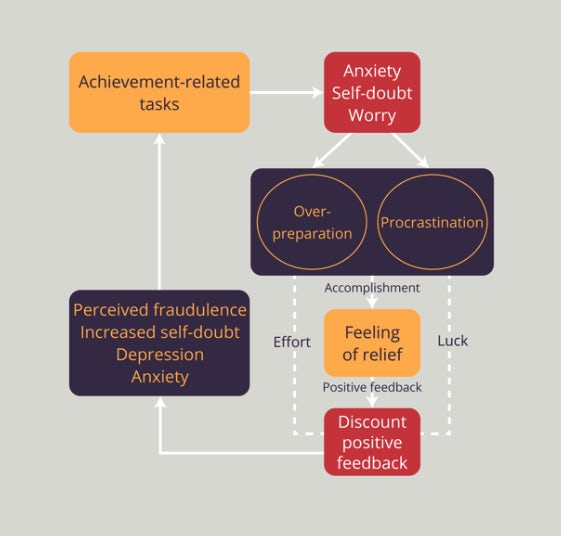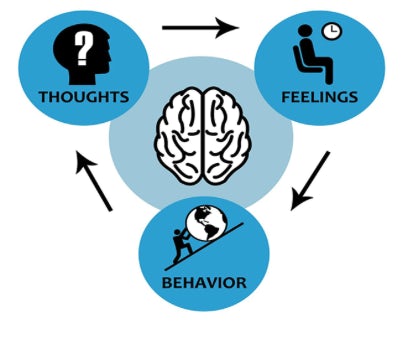Around 70% of tech workers feel as if they are imposters who only got to where they are due to blind luck, or by appearing to peers as being more intelligent than they feel they actually are. In this blog post, we will delve into imposter syndrome in tech, its meaning, symptoms, and most importantly, offer practical tips to overcome these feelings and embrace your true potential.
What is Imposter Syndrome?
Imposter syndrome refers to the belief that one’s accomplishments are the result of luck or deception rather than genuine ability. It can manifest as a fear of being exposed as unqualified, despite evidence of competence and achievements. In the tech world, where constant innovation and high standards prevail, imposter syndrome can be particularly prevalent. When entering your first role, or even as you are progressing through the bootcamp – it’s completely natural to have these feelings.
Recognising Imposter Syndrome Symptoms
Imposter syndrome can manifest in various ways, including self-doubt, fear of failure, perfectionism, comparing oneself to others, and dismissing accomplishments as mere luck. Identifying these symptoms is the first step towards overcoming imposter syndrome.
Common Imposter Syndrome Symptoms
Feeling like a fraud & that is is only a matter of time until you are “found out”
Feeling that you are not ready, worthy or good enough
Feeling exhausted by all/any of the Deadly P’s!
Suffering from self-doubt, self-criticism or self-judgement to unhealthy levels
Belittling or downplaying your own accomplishments
Withholding your thoughts, knowledge and opinions in meetings
Passing up opportunities to say in a “safe” place where you’ve outgrown the role
Feeling that you don’t belong in your role, team or organisation
It is however important to recognise that it doesn’t always mean you have imposter syndrome if you are doubting your abilities – sometimes you could be out of your comfort zone & struggling with tasks, so it’s important to ask for help!
Imposter Syndrome Cycle
This is a visual representation of the thoughts and feelings at particular points when looking at new tasks. 
Let’s break this down:
You have a new project or task to complete and a deadline in which this needs to be completed.
As the task is explained, your mind kicks in with anxiety, self-doubt and worry… “I’ve never done this before” “My skills are nowhere near this level” – but all the while, you are trying to display an outward confidence.
You’re then left to the task, and you start to get a more heightened sense of anxiety. At this point you may over-prepare (overthink) to the point of stress or start to procrastinate instead.
Phew..the task is done…! You’ve met the deadline and expectations and have a sense of relief. You get positive feedback and you put this down to luck or high effort levels.
This then feeds back to the feelings of being a fraud, self doubt or worry because you feel you “got away with it” or “got lucky.
Can you see a pattern occurring? The next task is going to lead you back into the same cycle and to feeling trapped…
Imposter Syndrome feeds off perfectionism and perfectionism off of Imposter Syndrome! This can manifest as overworking & over preparing. It’s important to note, continuing to be caught in the cycle can affect the following:
work performance
taking on responsibilities (either at work or in your personal life)
self-doubt
attributing success to outside factors
avoiding seeking promotion
job dissatisfaction and burnout
You are not alone
Tech workers and software engineers commonly suffer from Imposter Syndrome due to the ever-changing nature of the tech industry.
The feeling that you are undeserving of your current position as a worker in tech is one challenge many of our students and tutors at Northcoders may have faced at some point. In fact, tech workers and software engineers commonly suffer from Imposter Syndrome due to the ever-changing nature of the tech industry.
In fact, the last few years have shown us that remarkable steps are being made in the space such as massive advancements in Artificial Intelligence and developments in virtual and extended reality spaces.
With new technologies constantly emerging alongside the continued growth of the tech industry as a whole, it’s no wonder many people feel like they’re buckling under the pressure of the rapidly developing world of tech, and for newcomers looking to break into the tech industry, it can seem off-putting.
Sarah, one of our mentors and a former student at Northcoders had this to say;
“Someone from a later cohort told me to trust in the process and not worry about expecting to understand everything right away.”
Sarah also adds;
“The more experienced I’ve become, the more I realise that experience doesn’t actually give you that much more knowledge, it just makes you more comfortable with the not knowing.”
How do you know if you have it?
t’s likely you’ve already recognised some key elements of the syndrome in yourself as you’ve been reading this; and you’ve probably come to realise it’s more common than you think. But how do you know you actually have imposter syndrome? Take a moment to think about the following questions:
Do you attribute your success to “luck” or some external factor?
Are you sensitive to criticism of any kind?
Do you apologise over even the smallest of mistakes?
Do you downplay your knowledge?
Do you feel like someone is watching and is about to call you out as phony?
Here is a link to a test which gives a brief personalised score (this takes about 10 minutes).
Strategies to address Imposter Syndrome
If you were to sit and read through every result on Google you will find 5 commonly suggested strategies, so let’s break them down:
Talk about it
Reframe your thoughts
Own it
Collect the evidence
Practice a Growth Mindset
Now, don’t forget that this is not a one size fits all approach! How you address your imposter syndrome may vary from another persons depending on socio-economic factors. But these 6 points provide a starting point for you to address imposter syndrome.
1. Talk about it
Sounds easy, right? Not necessarily! Some people can find this really challenging but remember the majority of people have experienced Imposter Syndrome at some point in their careers so verbalise it and share the fear!
Confide in someone you trust – a peer or a mentor. They can offer insights into how they dealt with it.
Focus the conversation on giving your best, not being your best.
Look for opportunities to work with others so that goals and achievements become shared.
Ask others to share their knowledge and skills rather than expecting yourself to know everything. Work together on challenging tasks to address procrastination vs perfectionism. It will also allow overworkers to align their efforts with someone elses
Talking whilst working encourages you to let your guard down and share how you feel.
Try to identify someone who you can start a conversation with. How will you approach them?
2. Reframe your thoughts
Change your thoughts from obstacles to opportunities!
Acknowledge the imposter thoughts. Observe them, and critically question them.
Recognise that feelings are not facts. Feeling you are not worthy does not mean you are.
Whilst you have the same challenges as a colleague, you may not have the same imposter thoughts. It can be difficult to recognise that someone who is less anxious about a situation responds differently to it.
The diagram below shows the Cognitive Behaviour process, and how we get caught up in it going round and round. 
Cognitive Behaviour Process
Own it
When we have imposter syndrome we hold onto our mistakes and inadequacies. This video is about how you can acknowledge your imposter syndrome and still move forward.
Collect the evidence
If you have imposter syndrome it can be hard to see your achievements. You consistently dwell on fear and therefore forget your achievements or even dismiss them as a fluke.
By consciously recognising the specific events, tasks and times where you have succeeded – perhaps even recording these, you can begin to counter your self doubt. It’s important to be specific – what contributed to the success? This will allow you to have a more accurate perception of it.
A self-inventory can be valuable in areas where you feel particularly inadequate. Record aspects of what is done well, to build an accurate and less emotional picture. It will also help you to identify manageable targets.
Practise a growth mindset
First we need to address: What is a growth mindset?
A growth mindset is a belief that you can develop your skills and talents through hard work, the right strategies, and guidance from others. Awareness of mindsets can help you change how you view yourself and your life. Mindsets are habitual and therefore in order to change them, practice and repetition is needed.
Carol Dweck came up with 4 steps:
Learn to hear your fixed mindset “voice”
Recognise that you have a choice
Talk back to it with a growth mindset voice
Take the growth mindset action
One way to shift from a fixed to growth mindset is self-compassion; treat yourself with the same warmth and kindness that you would a friend.
Action plan
Now that you have a better understanding of Imposter Syndrome, recognising it and tackling it you can make your own action plan to make positive changes.
It could be a list, a mind map or a vision board – whatever works for you; but consider:
Any new insights that you discovered about yourself.
Two or three goals that would be likely to produce the most significant change in your life if you achieved them.
Strategies or actions you will take to achieve them.
How you will recognise and measure success.
If you want some motivation and accountability along the way, once you have created your action plan – share it! Be that with friends, or family, or your careers coach!
Imposter syndrome is a common phenomenon, especially in the tech industry, where high expectations abound. By recognising the symptoms and implementing these practical tips, you can overcome imposter syndrome and cultivate a positive mindset. Embrace your abilities, believe in your accomplishments, and remember that you are not alone in your journey. Overcoming imposter syndrome will empower you to thrive and make meaningful contributions in the dynamic and innovative world of tech.
If a tech career starting with the help of our Northcoders Bootcamp sounds like something you’re interested in, you can apply for a position on our next cohort on our website, or read more about the course here.